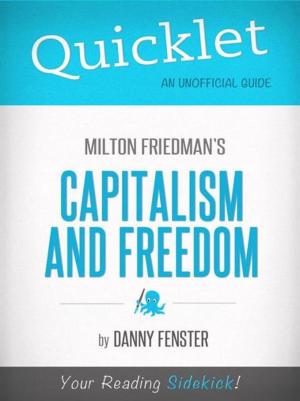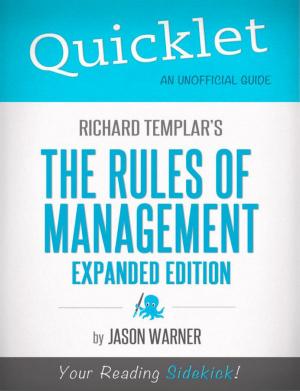Quicklet on George Clason's The Richest Man in Babylon
Nonfiction, Reference & Language, Study Aids, Book Notes, Art & Architecture, General Art| Author: | Ryan James Avery | ISBN: | 9781614646365 |
| Publisher: | Hyperink | Publication: | July 30, 2012 |
| Imprint: | Hyperink | Language: | English |
| Author: | Ryan James Avery |
| ISBN: | 9781614646365 |
| Publisher: | Hyperink |
| Publication: | July 30, 2012 |
| Imprint: | Hyperink |
| Language: | English |
ABOUT THE BOOK
The roaring ‘20s. America was in the throws of its post-war boom years. Men and women alike convened in local speak-easys where the Volstead Act couldn’t touch them to drink, dance, laugh, and listen to all the latest and greatest Swing.
It wasn’t all fun and games during this decade of personal freedom and financial prosperity. President Harding’s “return to normalcy” more or less began a period of isolationism in the US. The Senate failed to pass the Treaty of Versailles and the US did not join the newly created League of Nations. The fear of communism began to take root during this time, even before the USSR grew into the powerhouse it was after World War II. The KKK saw a resurgence in the 1920s as well, peaking mid-decade at around 4 million members.
While America saw unbridled growth, Europe began to fall into depression. Europe saw a staggering drop in employment with 5 million people without jobs, 2 million of those in Germany alone.
1926 was a particularly poignant. A rising star from Columbia University by the name of Lou Gehrig replaced Wally Pipp as the Yankees’ first-baseman, and future entertainers/artists Marilyn Monroe and Miles Davis were born. The 40-hour work week was first announced by Henry Ford, and NBC first hit the radio waves. Even as the rubble of WWI was being removed, the foundation for WWII began to build as Hirohito is crowned Emperor of Japan and Mussolini rises to power in Italy.
It’s also the year that George S. Clason wrote what is regarded as one of the finest sources on personal finance ever written: The Richest Man In Babylon. The book describes several simple rules to the reader through parables set in the ancient, wealthy city of Babylon.
Originally, Clason wrote several pamphlets regarding the making and saving of money. Due to their entertaining, simple nature, the pamphlets were widely accepted by the public and used by banks and financial institutions to inform clients in regards to personal finances. The Richest Man In Babylon is a collection of the most popular parables of that time.
EXCERPT FROM THE BOOK
The Man Who Desired Gold
Bansir, the chariot builder, sat dejectedly on a low wall outside his house. As he surveys his modest property, his wife pops out now and again giving him a disapproving “you should be working” look. As his glance moves to the hustle and bustle of the surrounding city, his friend Kobbi the musician walks up. Noticing Bansir is sitting around instead of working, Kobbi assumes things are going well for Bansir and asks to borrow two shekels for the Nobleman’s Feast. Bansir explains that he doesn’t have two shekels to lend, not even to his best friend. Kobbi asks why, if Bansir is in such dire straights, he isn’t working on the half-completed chariot in his workshop. Bansir replies that it’s due to a dream he had had the previous night. In the dream, he had all the money he could want, he was able to give freely to the poor and purchase all his heart desired. Upon waking, he came back to the realization that he had no money at all, and had been sitting glumly on the wall ever since. Bansir goes on to explain that both he and Kobbi had worked hard their entire lives, and made a decent amount of money over the span of years, and yet at this point had little to show for it. How, then, could two educated men have worked so hard yet attained so little?
Kobbi sympathizes with Bansir’s situation. He, too, has worked hard his whoe life playing his lyre and has very little to show for it. Kobbi mentions that he passed their mutual friend, Arkad, in the streets earlier that day. Remarking on the fact that his purse never empties, Bansir has an epiphany. It’s not just a sum of gold that he desires, but ever flowing source: income.
ABOUT THE BOOK
The roaring ‘20s. America was in the throws of its post-war boom years. Men and women alike convened in local speak-easys where the Volstead Act couldn’t touch them to drink, dance, laugh, and listen to all the latest and greatest Swing.
It wasn’t all fun and games during this decade of personal freedom and financial prosperity. President Harding’s “return to normalcy” more or less began a period of isolationism in the US. The Senate failed to pass the Treaty of Versailles and the US did not join the newly created League of Nations. The fear of communism began to take root during this time, even before the USSR grew into the powerhouse it was after World War II. The KKK saw a resurgence in the 1920s as well, peaking mid-decade at around 4 million members.
While America saw unbridled growth, Europe began to fall into depression. Europe saw a staggering drop in employment with 5 million people without jobs, 2 million of those in Germany alone.
1926 was a particularly poignant. A rising star from Columbia University by the name of Lou Gehrig replaced Wally Pipp as the Yankees’ first-baseman, and future entertainers/artists Marilyn Monroe and Miles Davis were born. The 40-hour work week was first announced by Henry Ford, and NBC first hit the radio waves. Even as the rubble of WWI was being removed, the foundation for WWII began to build as Hirohito is crowned Emperor of Japan and Mussolini rises to power in Italy.
It’s also the year that George S. Clason wrote what is regarded as one of the finest sources on personal finance ever written: The Richest Man In Babylon. The book describes several simple rules to the reader through parables set in the ancient, wealthy city of Babylon.
Originally, Clason wrote several pamphlets regarding the making and saving of money. Due to their entertaining, simple nature, the pamphlets were widely accepted by the public and used by banks and financial institutions to inform clients in regards to personal finances. The Richest Man In Babylon is a collection of the most popular parables of that time.
EXCERPT FROM THE BOOK
The Man Who Desired Gold
Bansir, the chariot builder, sat dejectedly on a low wall outside his house. As he surveys his modest property, his wife pops out now and again giving him a disapproving “you should be working” look. As his glance moves to the hustle and bustle of the surrounding city, his friend Kobbi the musician walks up. Noticing Bansir is sitting around instead of working, Kobbi assumes things are going well for Bansir and asks to borrow two shekels for the Nobleman’s Feast. Bansir explains that he doesn’t have two shekels to lend, not even to his best friend. Kobbi asks why, if Bansir is in such dire straights, he isn’t working on the half-completed chariot in his workshop. Bansir replies that it’s due to a dream he had had the previous night. In the dream, he had all the money he could want, he was able to give freely to the poor and purchase all his heart desired. Upon waking, he came back to the realization that he had no money at all, and had been sitting glumly on the wall ever since. Bansir goes on to explain that both he and Kobbi had worked hard their entire lives, and made a decent amount of money over the span of years, and yet at this point had little to show for it. How, then, could two educated men have worked so hard yet attained so little?
Kobbi sympathizes with Bansir’s situation. He, too, has worked hard his whoe life playing his lyre and has very little to show for it. Kobbi mentions that he passed their mutual friend, Arkad, in the streets earlier that day. Remarking on the fact that his purse never empties, Bansir has an epiphany. It’s not just a sum of gold that he desires, but ever flowing source: income.















